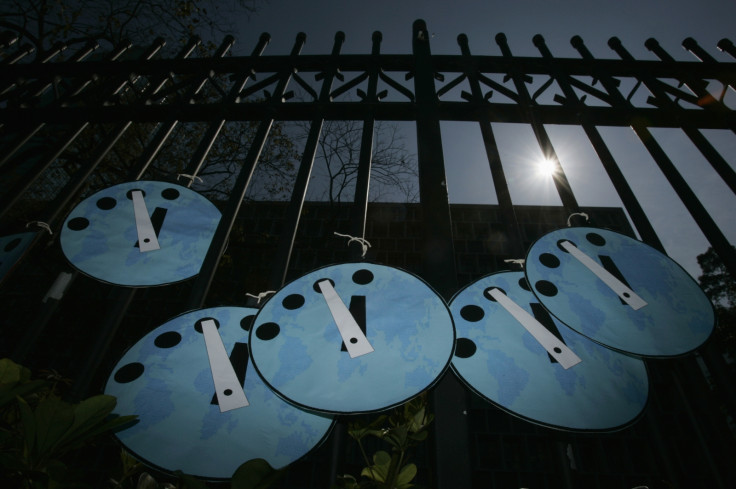Doomsday Clock at 3 minutes to midnight due to global warming and rising nuclear tensions

The Bulletin of the Atomic Scientists (BAS) has announced that the minute hand of the Doomsday Clock will be adjusted from five to three minutes to midnight, and that urgent action is required to prevent an imminent global catastrophe.
In particular, the BAS cited the continued global nuclear weapons modernisation, halting of nuclear reduction and unchecked climate change as key reasons why the clock has been moved forward.
The BAS' Science and Security Board said in a statement: "In 2015, with the Clock hand moved forward to three minutes to midnight, the board feels compelled to add, with a sense of great urgency: 'The probability of global catastrophe is very high, and the actions needed to reduce the risks of disaster must be taken very soon.'"
The BAS is a group of international scientists, which includes 18 Nobel laureates.
"The world will be between 3-8 degrees Celsius warmer by the end of the century. Global emissions rates are now 50% higher than in 1990," Richard Somerville, a member of the BAS' Science and Security Board and a distinguished professor emeritus at Scripps Institution of Oceanography, University of California San Diego, said at the press conference.
"Efforts at reducing global emissions of heat-trapping gases have so far been entirely insufficient to prevent unacceptable climate disruption.
"Unless much greater emissions reductions occur very soon, the countries of the world will have emitted enough carbon dioxide and other greenhouse gases by the end of this century to profoundly transform the Earth's climate."
Rising nuclear tensions
As for nuclear weapons, Sharon Squassoni, a member of the BAS' Science and Security Board, and director and senior fellow at the Proliferation Prevention Program, Center for Strategic and International Studies, said that nuclear weapons reduction programmes in the US and Russia have "ground to a halt".
From 2009 to 2013, the Obama administration cut only 309 warheads from the stockpile, while Russia cut only 1,000.
Squassoni also listed examples of other countries who have continued to expand and modernise their nuclear weapons programmes:
- UK has halved its pile of nuclear warheads, but still supports the Trident nuclear submarine programme
- France and China are developing nuclear ballistic weapons
- Israel continuing to modernise its undeclared nuclear forces
- North Korea expanding its nuclear weapons programme with no restrictions.
"Since the end of the Cold War, there has been cautious optimism about the ability of nuclear weapon states to keep the nuclear arms race in check and to walk back slowly from the precipice of nuclear destruction," she said.
"The other nuclear armed states are not willing to reduce their weapons until US and Russia reduce their warheads to under 1,000."
Take action while there is still time
Although the Doomsday Clock has not hit its worst time, which was two minutes to midnight in 1953 when the US government decided to pursue the hydrogen bomb, the scientists say that people must stand up and demand change, otherwise the globe will change irrevocably.
"The level of cooperation has been very low for renewable technology. Negotiators for climate change are working in a very narrow latitude and the governments themselves are working in the latitudes afforded to them by their constituents," said Somerville.
"In order to get the right level of cooperation, is that there has to be a demand for it, a need for it from the people and there needs to be a reduction in the burning of fossil fuels. [Otherwise], the resulting climate change will harm millions of people and will threaten many key ecological systems on which civilisation relies.
"We call upon world leaders to take coordinated and rapid action to drastically reduce global emissions of heat-trapping gases, especially carbon dioxide. We also urge the citizens of the world to demand action from their leaders. This threat looms over all of humanity. We all need to respond now, while there is still time."
© Copyright IBTimes 2025. All rights reserved.






















